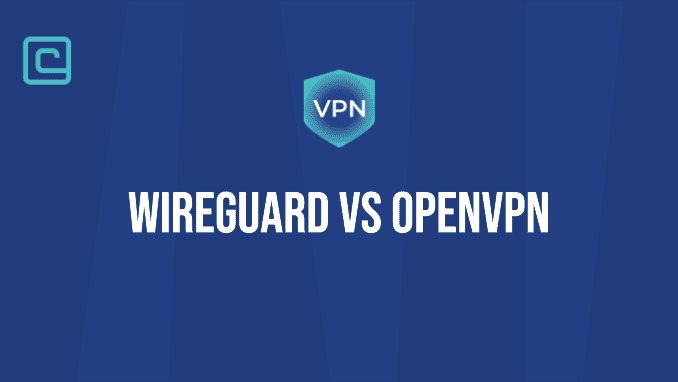WireGuard vs. OpenVPN – Which is Faster and Better? Full 2024 Comparison

WireGuard has gained significant attention for its potential to offer fast and secure VPN connections. With its modern cryptographic algorithms and streamlined design, WireGuard aims to provide optimal performance without compromising security. On the other hand, OpenVPN boasts a mature and customizable framework that has been widely adopted over the years.
While there’s no denying that both WireGuard and OpenVPN are top-quality protocols, there’s frequent debate as to which one is superior. In this detailed WireGuard vs. OpenVPN comparison article, I’ll compare the two protocols in a list of critical benchmarks to determine which one is a better pick. Let’s jump right into the details!
WireGuard vs. OpenVPN – A Brief Overview
WireGuard is a modern, lightweight, and efficient protocol known for its simplicity, strong encryption, and fast connection establishment. It has a smaller codebase, making it easier to audit.
OpenVPN, on the other hand, is a mature and highly customizable protocol that offers flexibility and a wide range of configuration options. It has a longer track record, extensive community support, and is more widely adopted.
| Feature | WireGuard | OpenVPN |
|---|---|---|
| Speeds | Fast | Average |
| Encryption and Security | Above Average | High |
| Privacy | Average | High |
| Auditability | High | Low |
| Censorship Circumvention | Average | High |
| Mobility | High | Low |
| Compatibility | High | High |
Test Your VPN Knowledge – Take A Quiz!
What Is WireGuard?
WireGuard is a modern and lightweight open-source VPN protocol designed to provide secure and efficient virtual private network connections. It was developed by Jason A. Donenfeld and introduced in 2015. WireGuard aims to simplify the technology of existing VPN protocols while maintaining strong security and performance.
The “lightweight” part of this protocol is essential. WireGuard is incredibly light for its abilities. It only uses 4,000 lines of code, an insignificant number compared to OpenVPN’s approximately 70,000 lines of code.
Unlike traditional protocols, WireGuard operates at the kernel level, integrating directly into the network stack of the operating system. This integration allows for faster and more efficient processing of VPN traffic.
WireGuard uses state-of-the-art cryptography, including Curve25519 for key exchange, ChaCha20 for encryption, and Poly1305 for data authentication, ensuring robust security. The WireGuard VPN protocol supports the User Datagram Protocol (UDP) and explicitly doesn’t use the Transmission Control Protocol (TCP).
WireGuard has gained popularity in the VPN industry due to its excellent performance, low latency, and quick connection establishment. Many operating systems, including Linux, Windows, macOS, iOS, and Android support WireGuard.
What Is OpenVPN?
OpenVPN is an open-source VPN protocol and software solution developed by James Yonan and released in 2001. OpenVPN is widely used and respected for its flexibility, strong security, and cross-platform compatibility. Over two decades since its release, it’s still regarded by many as the most secure VPN protocol.
At its core, OpenVPN establishes a secure tunnel between client devices and a server, encrypting all traffic passing through it. It uses a combination of industry-standard encryption algorithms, such as AES (Advanced Encryption Standard), to ensure the confidentiality and integrity of data.
OpenVPN operates in a client-server architecture and can be configured to work in various modes, including remote access VPNs and site-to-site VPNs. It supports multiple authentication methods, including certificates, usernames/passwords, and two-factor authentication. It has been the industry standard tunneling protocol for years. It is present in almost every VPN client in the business.
One of the significant advantages of OpenVPN is its flexibility. It can be used on a wide range of operating systems, including Windows, macOS, Linux, iOS, and Android. Additionally, OpenVPN’s configuration options provide administrators with fine-grained control over the VPN setup, allowing for customization and optimization based on specific requirements.
WireGuard vs. OpenVPN – Full Feature Comparison
Now that we know the fundamental traits of these two reliable VPN protocols, let’s see how they fare against each other. I’ve compared WireGuard and OpenVPN in seven key performance benchmarks. Here are the results:
Is WireGuard Faster Than OpenVPN?
WireGuard is typically faster than OpenVPN due to its lightweight design and efficient implementation. This isn’t a knock against OpenVPN, as no other VPN protocol can consistently put up the same numbers as WireGuard.
WireGuard aims for simplicity and minimal code, utilizing modern cryptographic protocols like the Noise protocol framework. This allows for faster and more secure connections.
Additionally, WireGuard benefits from its integration with the Linux kernel’s network stack. By leveraging kernel space instead of user space, WireGuard reduces the overhead and improves performance. This integration enables WireGuard to take advantage of various optimizations provided by the Linux kernel, resulting in faster throughput and lower latency.
On the other hand, OpenVPN, while highly flexible and robust, may introduce some performance overhead due to its design and additional encapsulation layers. OpenVPN uses the OpenSSL library for encryption and supports a wide range of platforms, which can impact its performance compared to WireGuard.
But, to give you a better feel of what the WireGuard and OpenVPN protocols can deliver, I’ve compared them directly in a series of tests, using NordVPN as my VPN service of choice. Here’s a table showcasing WireGuard and OpenVPN VPN connection speeds:
| Location | WireGuard | OpenVPN |
|---|---|---|
| Germany | 230 Mbps | 130 Mbps |
| United Kingdom | 226 Mbps | 117 Mbps |
| New York US | 210 Mbps | 105 Mbps |
| Los Angeles, US | 201 Mbps | 99 Mbps |
| Japan | 184 Mbps | 90 Mbps |
*Locations listed from nearest to farthest, using a baseline connection of 250 Mbps.
Winner: WireGuard
Encryption and Security: Is WireGuard or OpenVPN Safer?
Both protocols support a variety of secure encryption techniques. Moreover, neither protocol has any known security vulnerabilities. As a fairly new protocol, WireGuard uses more modern methods that minimize any potential security flaws.
On the other hand, OpenVPN has a long track record most VPN protocols can’t boast. Additionally, WireGuard’s smaller size means that this protocol has a smaller attack surface. There are fewer attack points for hackers to exploit, and the protocol is immune to downgrade attacks. Moreover, if there is a breach, all endpoints must update to a new WireGuard version immediately.
But, OpenVPN isn’t without its strengths in this comparison. It offers greater flexibility, as it supports more encryption techniques. Considering both sides, it all depends on your network’s complexity and flexibility demands. With that in mind, here’s how the two compare in terms of encryption and security features:
| Security Features | WireGuard | OpenVPN |
|---|---|---|
| Encryption Ciphers | ChaCha20 | AES, Blowfish, Camellia, ChaCha20, DES, Triple DES, and more |
| Max Length of Encryption Keys | 256-bit | 4096-bit |
| Authentication | Poly1305 | Poly1305 |
| Transport Layer Protocol | UDP | UDP or TCP |
| Hashing | BLAKE2s | MD5, MD4, SHA-1, SHA-2, MDC-2, BLAKE2, and more |
Winner: Tie
Does WireGuard or OpenVPN Offer Better Privacy?
At face value, OpenVPN is the better tunneling protocol in terms of privacy protection. This is because it has a zero-logs policy, which goes excellently with a VPN service that doesn’t keep any logs.
In comparison, WireGuard doesn’t have the same policy. It is designed to store user IP (Internet Protocol) addresses until a server reboots. If a server gets compromised, all of the IP addresses will get compromised too. So, if you prefer using the WireGuard protocol, keep in mind that the VPN is likely storing your IP address, at least while you’re connected to a server.
Of course, this doesn’t paint the full picture. Virtual Private Networks understand that the potential for user IP addresses leaking is a very bad scenario. That’s why they implement tools and features such as double VPN and double Network Address Translation to safeguard IP addresses. The former hides the user’s IP address behind multiple VPN tunnels. The latter uses a dynamic instead of a static IP address, meaning every session has a unique IP.
These features reduce the difference between the two and mitigate WireGuard’s logging practices. However, if you live in a restrictive and authoritarian country, it’s probably better to stick with OpenVPN as the more private solution.
Winner: OpenVPN
Which Protocol is Easier to Audit?
To fully trust a protocol, you must know how it works inside out. At least, there needs to be concrete evidence provided by auditors that the protocol works as advertised. In the context of this WireGuard vs. OpenVPN comparison, this is where the total length of code comes into play.
The amount of code lines directly influences how auditable a VPN protocol is. As I previously mentioned, the WireGuard protocol has only around 4,000 lines of code. With about 70,000 lines of code, nearly 18 times as much.
Of course, this doesn’t mean that OpenVPN isn’t auditable. However, it takes auditors far less time and resources to audit WireGuard. Moreover, as it’s a more streamlined protocol, auditors have an easier task pinpointing any bugs or security vulnerabilities. Over time, WireGuard will be a much more widely audited protocol than OpenVPN.
Winner: WireGuard
How do These Two VPN Protocols Compare in Censorship Circumvention?
As OpenVPN can use TCP connections, it can use TCP port 443. In simpler terms, this is the same port HTTPS traffic uses. This enables the OpenVPN connection to work in highly authoritarian locations. This port is crucial for many online activities.
By blocking it, censors in authoritarian countries such as China or Russia wouldn’t only block commercial VPN services, but restrict many other types of online activities. So, for bypassing censorship – OpenVPN can go much further than WireGuard, which only supports UDP.
In line with that, the veteran protocol is also the winner when comparing OpenVPN-WireGuard deep packet inspection prevention. While some techniques can still detect OpenVPN traffic, it is far less susceptible to deep packet inspection than WireGuard.
It’s worth mentioning that some of the top VPNs in the business offer additional features that minimize the difference between these two protocols and make them equally adept at bypassing censorship. One of these features is VPN obfuscation, which masks your VPN traffic as regular Internet traffic.
Winner: OpenVPN
Time to Connect to VPN Server and Overall Mobility
Another important comparison aspect is the overall time to establish a VPN tunnel. This is vital in situations when your VPN connection breaks and you want to establish a stable Internet connection through another VPN server fast. WireGuard is much faster, as it takes only about a hundred milliseconds to establish a connection. In comparison, OpenVPN needs several seconds, at the minimum.
If you’re regularly switching between VPN servers, WireGuard is clearly the better pick. Moreover, if you’re using a mobile device, WireGuard provides greater flexibility, as it handles transitions better than OpenVPN.
Mobile users regularly switch between Wi-Fi networks and mobile data. Many times, this happens without the user even realizing it. WireGuard makes this transition much smoother and faster. OpenVPN is not as efficient with this, leaving more room for total disconnection or even data leaks.
To be objective, when talking about the best VPN protocols for mobile devices and mobility in general, neither protocol takes the cake. IKEv2 is the default protocol many VPNs use for their mobile apps. Still, to pick a winner of this OpenVPN-WireGuard matchup, I find the latter solution the best VPN protocol in this regard.
Winner: WireGuard
Which Protocol Offers Better Compatibility?
As the OpenVPN protocol has been around for much longer, it’s easy to assume that it offers much greater compatibility than the WireGuard protocol. On the other hand, WireGuard is more modern and arguably better tailored for newer devices. Specifically, its reduced size and great speed make it a prime choice for mobile devices.
Due to its enduring presence in the industry, OpenVPN is the default protocol on many platforms and for many VPN providers. You can find it in almost every VPN app. Additionally, there are many more routers that support OpenVPN than those that support WireGuard.
Focusing on VPN providers specifically, the two protocols are very close, although more and more VPN services are introducing the WireGuard protocol in their apps. Moreover, as WireGuard is specifically designed to integrate with the Linux kernel, it is the better protocol for this operating system.
To better illustrate how close these two protocols are in terms of compatibility, here’s a quick WireGuard vs. OpenVPN table comparison across the top VPN services in the business:
| VPN Provider | WireGuard | OpenVPN |
|---|---|---|
| NordVPN | Yes (NordLynx) | Yes |
| Surfshark | Yes | Yes |
| Atlas VPN | Yes | No |
| PrivateVPN | Yes | Yes |
| ExpressVPN | No | Yes |
| Private Internet Access | Yes | Yes |
| CyberGhost | Yes | Yes |
| Proton VPN | Yes | Yes |
Winner: Tie
The Final Verdict – Should You Use WireGuard or OpenVPN Protocol?
Considering the overall performance and efficiency, as well as the modern design of WireGuard, it’s easy to see why WireGuard has become the protocol of choice for many users. WireGuard’s streamlined approach, faster speeds, and lower resource utilization make it an excellent VPN protocol for users seeking optimal performance.
However, it’s important to note that specific use cases and requirements may vary. If you have specialized network needs or rely heavily on features provided by OpenVPN (such as complex network configurations), OpenVPN might still be a suitable choice.
Ultimately, both WireGuard and OpenVPN are top-quality open-source VPN protocols when implemented properly. I recommend evaluating your specific needs, performing tests, and considering factors like platform compatibility, security requirements, and ease of configuration. This will help you make an informed decision about which protocol is the best fit for your particular situation.
WireGuard vs. OpenVPN FAQs
Is WireGuard a VPN?
WireGuard is a VPN protocol. It’s designed to create secure and private communication channels over the Internet. WireGuard establishes encrypted tunnels between client devices and a VPN server.
Is WireGuard secure?
Yes, WireGuard is considered a very secure protocol. It incorporates modern cryptographic algorithms and has been designed with a focus on simplicity and minimal attack surface.
Is OpenVPN secure?
Yes, OpenVPN is considered one of the best protocols for ensuring VPN security. It uses robust encryption and supports various authentication methods. It has been extensively audited and tested over the years and is a very safe and reliable protocol.
Which protocol is more secure, WireGuard or OpenVPN?
Both WireGuard and OpenVPN are secure protocols, and it’s challenging to declare one as the superior choice in terms of security. OpenVPN is a classic and safe pick. Conversely, WireGuard is still maturing and is building a great track record for itself.
Is WireGuard the fastest VPN protocol?
While Wireguard is very fast, it is not the fastest tunneling protocol. There are other protocols that offer better speeds. However, they do so by compromising on security. With that in mind, you can say that WireGuard is the fastest secure protocol.
Can WireGuard replace OpenVPN?
WireGuard has the potential to replace OpenVPN due to its simplicity, efficiency, and modern cryptographic algorithms. However, OpenVPN is supported by more routers and supports TCP. So, it’s highly unlikely that WireGuard will replace OpenVPN any time soon.
Is WireGuard easier to set up than OpenVPN?
Yes, WireGuard is generally considered easier to set up compared to OpenVPN. One of the key reasons for this is WireGuard’s minimalistic design. It has a smaller codebase and a straightforward configuration process, making it more user-friendly.
Cybersecurity and VPN researcher

